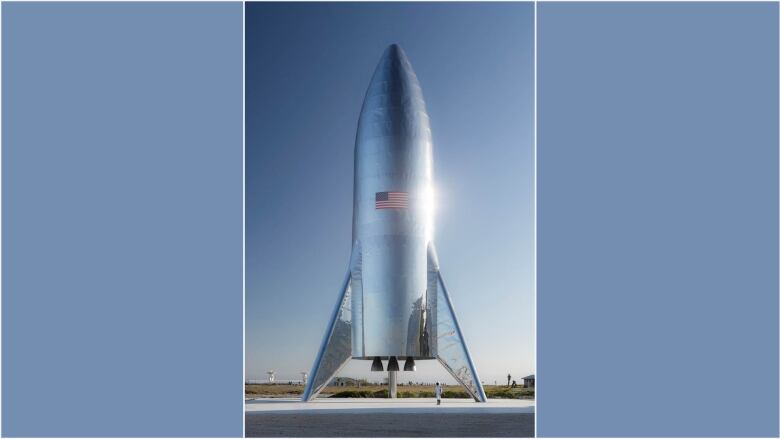Elon Musk reveals SpaceX Starship
Testing to begin in 4 to 8 weeks, Musk says

On Thursday, Elon Musk revealed on Twitter the SpaceX Starship, a rocket that he said will one day ferry humans to Mars.
The rocket has a kind of retro feel, reminiscent ofrockets depicted in early science fiction. Musk's image has a person in a spacesuit standing next to it in order to illustrate its scale.
Starship test flight rocket just finished assembly at the @SpaceX Texas launch site. This is an actual picture, not a rendering. pic.twitter.com/k1HkueoXaz
—@elonmuskThe rocket renamed from the original Big Falcon Rocketis actually a "hopper"and part of the two-part ship that Musk hopes will take humans to the red planet.
The orbital Starship will be similar to the Falcon rockets in that there will be two stages: the Super Heavy booster that willland back on Earth after getting the Starship away from Earth's gravitational pull, and then the Starship that will take people to Mars.
SpaceX first Starship hopper under Texas Boca Chica Beach's cloudy sky.@elonmusk #Starship #SpaceX pic.twitter.com/hVg5Ken7Vp
—@JaneidyEveJust as the Falcon 9 stages were tested for vertical takeoff and landing (VTOL), so will Starship, meaning it won't be taking anylong-haul flights. Musk said in a tweet that the test runs should begin in the next four to eight weeks.
If all goes well, eventually the spaceship will sit atop a Super Heavy, similar to the Falcon Heavy that successfully launched in February 2018 and head to Mars. That Starship, Musk tweeted, "is taller, has thicker skins (won't wrinkle) & a smoothly curving nose section."
SpaceX is preparing to test launch its Crew Dragon, which would take astronauts to the International Space Station. In 2014, NASA awarded both SpaceX and Boeing contracts to build spacecraft to get astronauts back into space from U.S. ground. Since 2011, the agency has been relying on Russia's Soyuz rockets with a hefty price tag of roughly $80 million per seat. The launch was scheduled for January 17, but due to the U.S. government lockout, it has been pushed to February at the earliest.












_(720p).jpg)


 OFFICIAL HD MUSIC VIDEO.jpg)
.jpg)



























































































